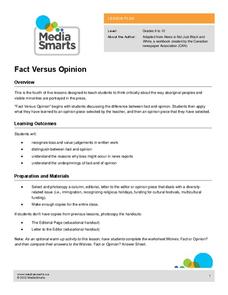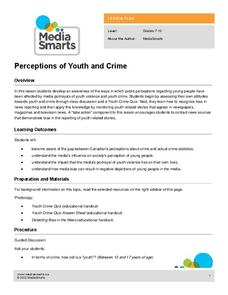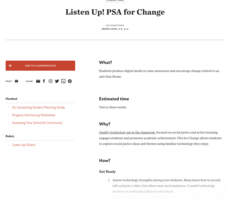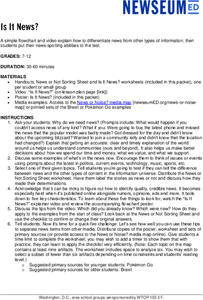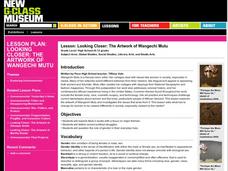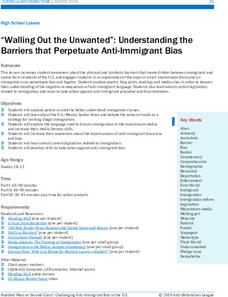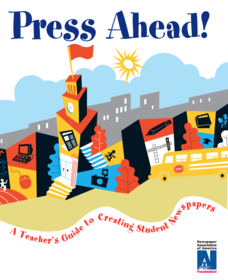Media Smarts
Fact versus Opinion
Part of a series aimed at breaking down cultural bias from the Canadian Media Awareness Network, this activity identifies where opinions do and don't belong in a newspaper. Pupils review handouts about the purpose of editorial comments...
Media Smarts
Learning Gender Stereotypes
How do media representations influence our attitudes? Examining advertisements through the filter of gender representation forms the basis of this, the second of three lessons that address gender stereotypes. Resources include links,...
Curated OER
Marketing to Teens: Parody Ads
High schoolers deconstruct advertising messages by analyzing parody ads and exploring the purpose of satire. Then they create their own parodies based on real ads discussed in class. A creative activity to extend any study of media,...
Newseum
'The Press and the Civil Rights Movement' Video Lesson
Scholars watch a video featuring journalists who covered the civil rights movement, then respond to questions on a viewing guide. The video features interviews with participants and original news footage from the 1950s and 1960s. In...
Newseum
Free Press Challenges Through History: Analyzing Historical Sources
The debate over the integrity of stories in media is not new. Young journalists analyze historical sources that reveal freedom of the press controversies and draw parallels to challenges freedom of the press faces today.
Media Smarts
Perceptions of Youth and Crime
Explore the potential for bias in the news and in scholars' own attitudes and opinions. Begin with a quiz on youth crime to see how learners perceive crime among their peers. After looking at the correct answers, put individuals in...
Teaching Tolerance
Listen Up! PSA for Change
Challenge scholars to speak up about a topic by creating a public service announcement or social media blitz about an issue they feel passionate about. Have them research their issues, then decide the best way to take their messages to...
Media Smarts
The Broadcast Project
As part of a unit on media studies, kids are asked to chart their viewing habits, observe the advertising that sponsors their favorite shows, and then to imagine what they would broadcast if given a block of airtime.
PBS
Interviewing: The Art of Asking Questions
Interviewing skills are important, even outside of a news reporter's desk or employer's office. Take your class through the process of interviewing people they don't know with a set of case studies featuring journalists and various...
PBS
What Is Newsworthy?
What is news? What is newsworthy? Who decides and what criteria do they use? Introduce young journalists to the basics of reporting with this media literacy lesson.
Newseum
Is It News?
Is it news or not? That is the question young journalists must consider in a lesson about newsworthiness. Class members watch a short video that details five key characteristics of quality, credible news. Individuals then use these tips...
Center Science Education
Weather in the News
Tornadoes, blizzards, and hurricanes, oh my! In this lesson, meteorology majors compare stories of historical storms written by two or more different sources. As a result, they understand how the media portrays such catastrophes and...
Curated OER
Lesson: Looking Closer: The Artwork of Wangechi Mutu
Social issues of gender and media stereotypes, begins with a multi-sensory experience. Learners view the painting Backlash Blues and make critical comments based on what they see. They then read the Langston Hughes poem and listen to the...
Smithsonian Institution
POWs
Why did Vietnam POWs and their families receive more media attention than POWs in previous wars? To answer this question, class members view artifacts, read articles, and engage in class discussion. Individuals then assume the voice of...
West Virginia Department of Education
Intelligence of Authentic Character - News Coverage and John Brown's Raid
The resource, a standalone, shows how news coverage of John Brown's Raid began when the event happened and how that reporting shaped perception in West Virginia history. The resource includes interesting anticipatory discussion...
Curated OER
Savvy Surfers: Website Evaluation and Media Literacy
Sixth graders strengthen their understanding of what a high quality website is composed of. Learners evaluate three websites for accuracy, credibility, and reliability by completing a chart.
Facebook
Online Presence
What happens when an online post gets the wrong kind of attention? Learners evaluate the good, the bad, and the occasionally ugly side of social media posting with a instructional activity from a vast digital citizenship series. After...
Teaching Tolerance
You Are the Product
What does it mean for a product or service to go viral? Scholars explore the topic by reading an article about the economics of social media. After reading, they complete a 3-2-1 data chart with information they learned from the text and...
Newseum
Bias Through History: Analyzing Historical Sources
Young journalists use the E.S.C.A.P.E. (evidence, source, context, audience, purpose, and execution) strategy to evaluate historical and contemporary examples of bias in the news. The class then uses the provided discussion questions to...
profitt.gatech.edu
Effective Communication: Listening, Speaking, Writing, Interpreting
Help young learners become active listeners and strong public speakers with a set of activities that range from paraphrasing, to discussions, and self-reflection. Additionally, the lessons address social media skills and non-verbal...
Overcoming Obstacles
Good Citizenship
An individual's background and experiences affect their worldview and interaction. In this lesson, scholars draw a pair of glasses with pictures of experiences they've been through, relate the responsibility to social media and the...
Anti-Defamation League
“Walling Out the Unwanted”: Understanding the Barriers that Perpetuate Anti-Immigrant Bias
As part of a study of immigrant bias, high schoolers investigate the language used in blogs, readings, media reports, and current legislation whose language perpetuates xenophobia. They then consider ways they can get involved in...
American Press Institute
Newspapers in Your Life: What’s News Where?
Big news isn't necessarily newsworthy everywhere! How do journalists decide what to cover with so much happening around them? A instructional activity on media literacy examines the factors that affect the media's choice of stories to...
Newspaper Association of America
Press Ahead!
Give class members some great news! A media unit teaches individuals about ethics, parts of a newspaper, business writing, photojournalism, and more topics that have to do with the press. Full of material for a variety of learners,...
Other popular searches
- Media Education
- Communications and the Media
- Media Organizations
- Digital Media
- Media Center
- Information Media & Technology
- Mixed Media
- Media Bias
- Media Influence
- Media Education Propaganda
- Media Censorship
- Media Education Esl


